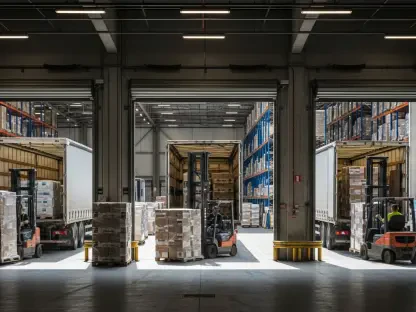In a significant shift for international shipping, a major logistics provider has recently suspended its money-back guarantee for deliveries into the United States, a decision triggered by the termination of a long-standing customs exemption. This policy change, which previously allowed low-value imports to bypass duties and taxes, has upended the smooth flow of cross-border shipments. With the holiday season looming, the timing of this suspension raises serious concerns for shippers and consumers alike, as delays at customs threaten to disrupt the busiest time of year. The ripple effects of this development are already being felt across the industry, with companies scrambling to adapt to a more complex and time-intensive import process. This article delves into the reasons behind the suspension, the broader impact on the logistics sector, and the historical context of such measures during times of supply chain upheaval. As global trade dynamics shift, understanding these changes becomes crucial for stakeholders navigating the new landscape of U.S. imports.
Customs Challenges in a Post-Exemption Era
The elimination of the de minimis exemption, which once permitted imports valued under a certain threshold to enter the U.S. without duties or taxes, has created a challenging environment for logistics providers. Announced earlier this year, this policy shift has forced shipments that were previously fast-tracked through customs to now undergo formal clearance processes. A prominent carrier, in response, suspended its Service Guarantee for specific international delivery options, citing the increased risk of delays as the primary reason. This decision affects a wide range of services critical to businesses relying on timely imports. The added layer of scrutiny at customs, especially for shipments requiring approval from other government agencies like the Food and Drug Administration, has significantly slowed down processing times. As a result, the industry faces heightened uncertainty, with many questioning how to maintain efficiency under these stricter regulations.
Compounding the issue is the timing of this policy change, which aligns with the peak holiday shipping season when parcel volumes typically surge. The suspension of guarantees means that shippers can no longer rely on refunds for late deliveries, placing additional financial pressure on businesses already grappling with rising costs. For retailers and e-commerce platforms, this could translate into missed deadlines and dissatisfied customers during a critical sales period. Beyond the immediate impact, the broader implication is a potential reevaluation of supply chain strategies to mitigate risks associated with customs delays. Industry experts suggest that companies may need to diversify sourcing or invest in more robust logistics planning to navigate this new reality. While the full extent of disruptions remains unclear, the consensus is that the end of the exemption marks a turning point for international trade, demanding adaptability from all involved parties.
Industry-Wide Adjustments to New Trade Realities
The fallout from the de minimis exemption’s termination extends far beyond a single carrier’s decision to suspend guarantees, affecting a wide array of stakeholders in the shipping and retail sectors. Major shippers, including prominent apparel brands, are now reassessing their supply chains, which had been structured around the benefits of duty-free imports for low-value goods. This sudden shift has prompted some to explore alternative sourcing locations or adjust pricing models to account for added tariffs and processing fees. Meanwhile, international postal operators have also encountered significant disruptions, with certain services to the U.S. being temporarily halted before resuming under the updated customs framework. This collective response underscores a shared recognition that the trade landscape has fundamentally changed, requiring innovative approaches to maintain operational flow.
Further illustrating the scale of adaptation, logistics providers across the board are revising their policies to manage the risks of delayed shipments. The suspension of money-back guarantees is not an isolated move but part of a broader trend among carriers to protect against financial liabilities tied to factors outside their control. Shippers are now faced with the dual challenge of complying with more stringent entry requirements while striving to meet customer expectations for timely delivery. As these adjustments unfold, there is growing concern about the long-term impact on the cost and competitiveness of U.S. imports. Analysts predict that smaller businesses, which relied heavily on the exemption to keep expenses low, may struggle the most in this new environment. The overarching narrative is one of transformation, as the industry seeks to balance compliance with efficiency in an era of heightened regulatory oversight.
Historical Parallels and Strategic Responses
Looking back, the suspension of service guarantees during periods of supply chain disruption is not a new strategy for logistics giants. In the past, similar measures were taken during global crises, such as the widespread turmoil caused by health-related emergencies, when carriers halted refunds for delayed domestic and international services. More recently, ongoing labor disputes and operational hiccups in specific regions have led to comparable suspensions for shipments to and from affected areas. These historical parallels highlight a recurring pattern: when faced with uncontrollable delays, logistics providers often prioritize financial stability over customer assurances. This pragmatic approach, while understandable, shifts the burden of risk onto shippers and end consumers, who must now navigate uncertainty without the safety net of guaranteed refunds.
Reflecting on these precedents, it becomes evident that the current suspension tied to the de minimis exemption’s end is part of a broader strategy to mitigate exposure to systemic challenges. Carriers are likely to maintain such policies until customs processes stabilize or alternative solutions emerge to streamline imports. For shippers, this historical context serves as a reminder to build resilience into their operations, whether through contingency planning or diversifying delivery partners. The key takeaway from past disruptions is the importance of flexibility in responding to policy-driven changes. As the logistics sector continues to grapple with the fallout from this exemption’s termination, drawing lessons from earlier crises could guide stakeholders in crafting sustainable strategies. The industry’s ability to adapt in previous challenging times suggests a path forward, even as the complexities of today’s trade environment test the limits of operational agility.
Navigating the Future of U.S. Imports
Reflecting on the recent suspension of money-back guarantees by a leading carrier, it becomes clear that the logistics industry must confront unprecedented challenges following the termination of the de minimis exemption. The increased customs delays and formal clearance requirements have set a new precedent for how international shipments are processed at U.S. borders. This policy shift has not only disrupted the flow of low-value imports but also placed significant strain on shippers during a peak holiday period. The response from various stakeholders, from major retailers to international postal operators, paints a picture of an industry in transition, compelled to rethink long-standing practices in light of stricter regulations.
Looking ahead, the focus shifts to actionable steps that could ease the burden of these changes. Industry players are encouraged to invest in advanced tracking systems and collaborate with customs authorities to expedite clearance processes. Exploring regional warehousing solutions to bypass some border delays emerges as another viable option. Additionally, policymakers face pressure to provide clearer guidelines or temporary relief measures to support businesses during this adjustment period. As the sector moves forward, fostering dialogue between carriers, shippers, and regulators promises to be essential in addressing lingering uncertainties and ensuring the competitiveness of U.S. imports in a transformed trade landscape.









